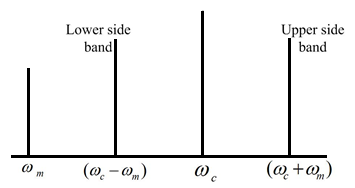Question
Question: In amplitude modulation, sinusoidal carrier frequency used is denoted by \({\omega _c}\) and the sig...
In amplitude modulation, sinusoidal carrier frequency used is denoted by ωc and the signal frequency is denoted by ωm. The bandwidth (Δωm) of the signal is such that, Δωm<<ωc. The frequency not contained in the modulated wave is then,
(A) ωc−ωm
(B) ωm
(C) ωc
(D) ωm+ωc
Solution
The amplitude modulation is modulation of a wave by varying its amplitude. In amplitude modulation, the amplitude of the carrier wave is varied in proportion to that of the message signal being transmitted. The modulation wave has namely three frequencies f1, f2 and f3 corresponding to (ωc+ωm), ωc and (ωc−ωm) in terms of angular frequencies. ωc is the carrier wave frequency, (ωc+ωm) is the upper side band frequency and (ωc−ωm) lower side band frequency.
If the bandwidth (Δωm) of the signal is such that Δωm<<ωc, then the frequency spectrum lies within (ωc+ωm),ωc and (ωc−ωm).
Complete step by step solution:
Given,
The sinusoidal carrier frequency is ωc.
The signal frequency is ωm.
The bandwidth is given as Δωm<<ωc.
Here, (ωc−ωm) is called the lower side frequency band and (ωc+ωm) is called upper side frequency band. The modulated wave consists of the carrier wave frequency ωc and addition and subtraction of the signal frequency in the side bands. The frequency spectrum is shown in the figure below.

It can be observed that the frequency of the modulated wave lie between (ωc+ωm) and (ωc−ωm) but ωm does not lie in between the spectrum. It means the frequency which is not contained in the modulated wave is ωm.
Hence, the correct answer is (B).
Note: The students have to understand the amplitude modulation and the frequency corresponding to in amplitude modulation. The frequency of the carrier waves and the modulated wave lies in between a band called upper sideband and lower side band. One can also obtain the answer from the frequency spectrum graph of the amplitude modulated wave.
